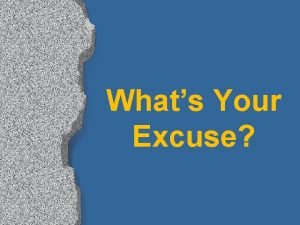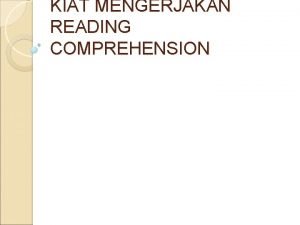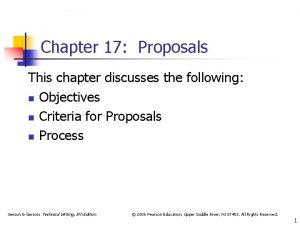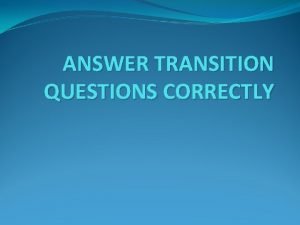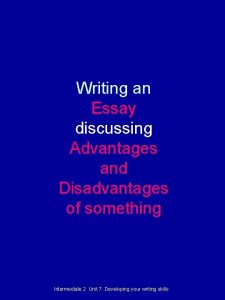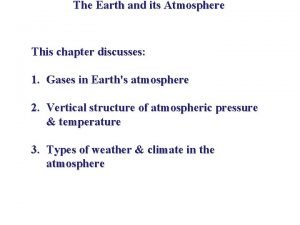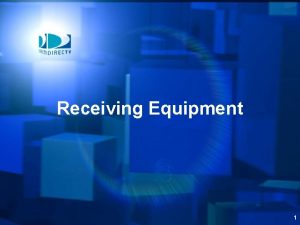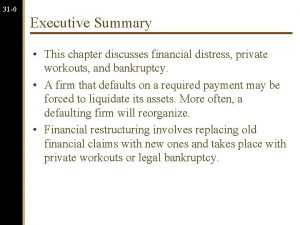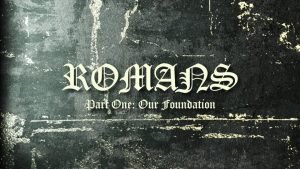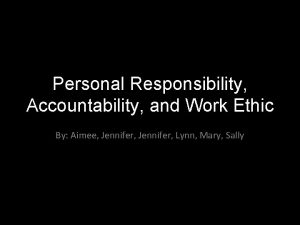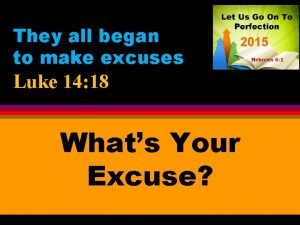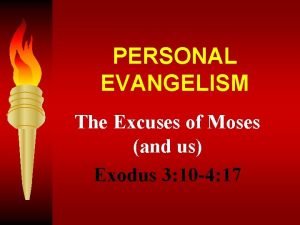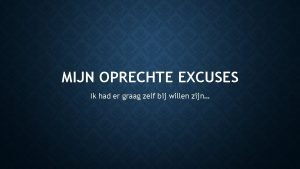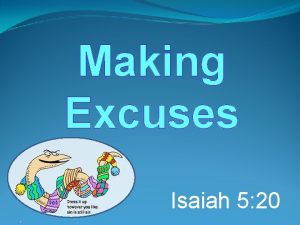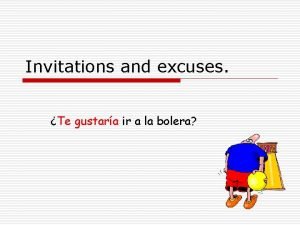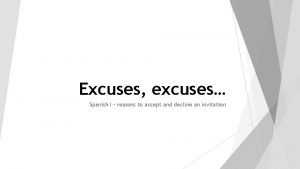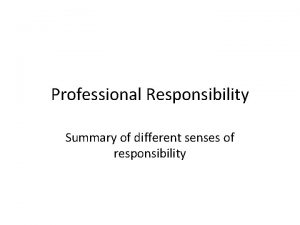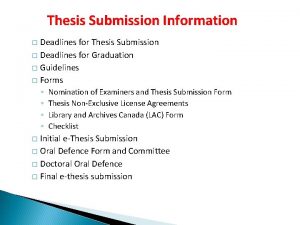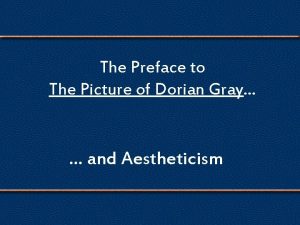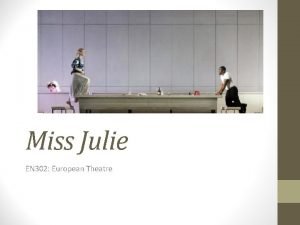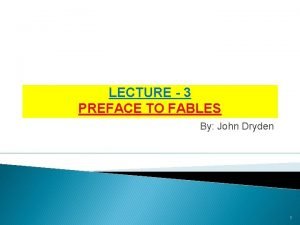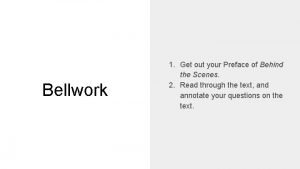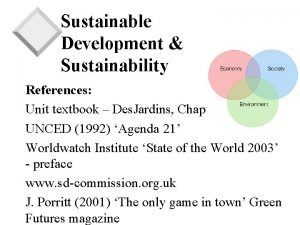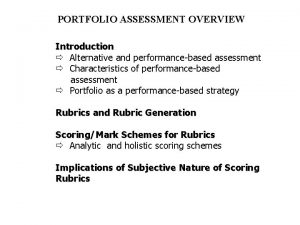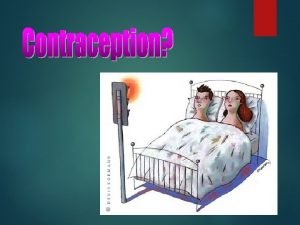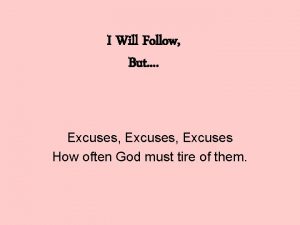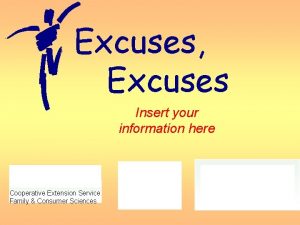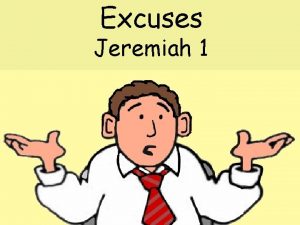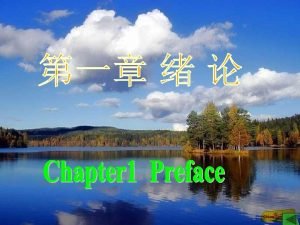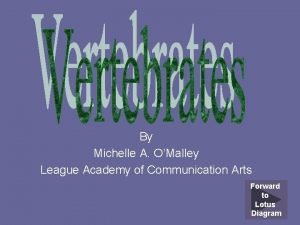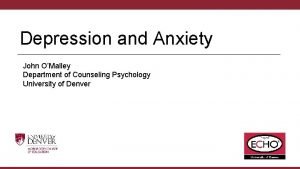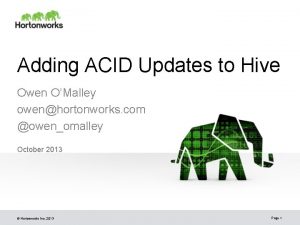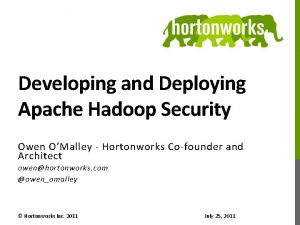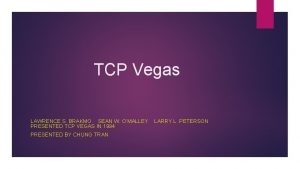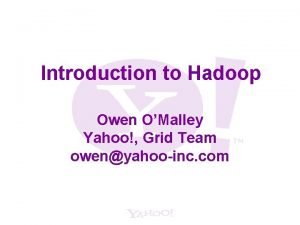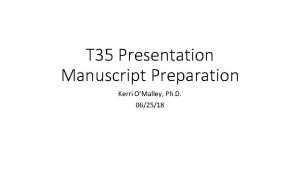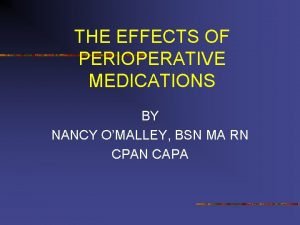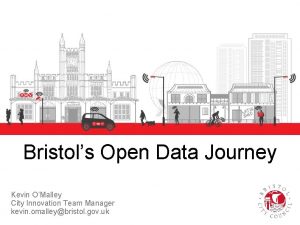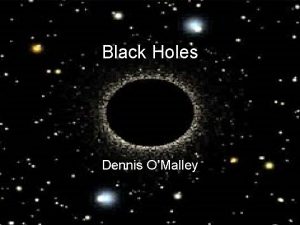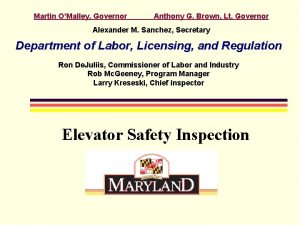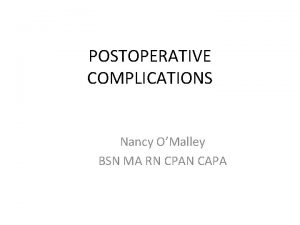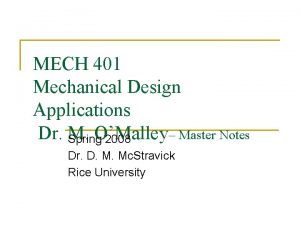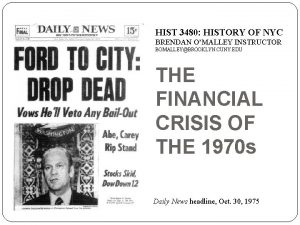Preface OMalley discusses the excuses people use to











































- Slides: 43


Preface O’Malley discusses the excuses people use to avoid the truth: �"We don't talk about those kind of things at home. " �“Guilt trips are bad for you. They screw up your life. " �"I didn't ask to be born. " �"Look, I cheated because my dad will kill me if I fail. " �"My parents? They are the last people I would tell!" �"Religion’s okay in school for a while-and for little kids and old people. " �"If she wants sex as much as you do, who's getting hurt? "

Problems with the new society � People have distorted terms like "economy" to fit the new lifestyle. At one time it meant "thrift" now it stands for a prodigal way of life that encourages the gullible to spend as if credit cards never come due. � The new Scriptures equal Wall Street Journal, Forbes, the Dow Jones � the new priests = investment bankers, the Fed, brokers � the new Saints = Steve Jobs, Donald Trump, Mark Zuckerberg � the new rituals = the Super Bowl, the World Series, the Olympics � People are no longer present because they are lost in their cell phones � The sacredness of sex is lost � We've lost our sense of sin.

General suggestions (xv) � Father O'Malley presents some suggestions for coming to discover the living God in our lives. � He tells us to remember: genuine learning begins in curiosity or it is no more than wasted time. � We must come to understand that the existence of God is a matter of incontrovertible fact. � We must develop a sense of gratitude for the presence of the Divine Being, for faith for our existence. From this we have the word “Eucharist” = “giving thanks. ”

Introduction: Why bother? page 1 � The book focuses on this question: is the whole thing really worth even mild consideration? � Most people would rather focus on the scandals of the Church and teaching that they do not agree with - rather than explore the God question. � The worst case scenario -- if God does not exist, and there is nothing real outside my mind that can validate the idea of God I have inside my head, that all the questions I have are absurd. � There are some characteristics that we must assume about the Mind Behind It All: 1) it must be an intelligent being who freely chose to allow me my chance to live. 2) God specifies everything on the face of the earth serves its own purpose and also how I can properly use each thing.

Throughout the book we will be asking ourselves these questions: � 1. Does God exist? � 2. What is God like? � 3. How can I be sure?

How Can I Be Sure? p. 3 A faith that does not constantly expose itself to the possibility of unfaith is no faith at all but a mere convenience. -Martin Heidegger � Dei Filius declared, “If anyone says the one, true God, our Creator and Lord, cannot be known with certainty from the things that have been made, by the natural light of human reason let him be anathema (or banished, excommunicated)” � Humani Generis (written by Pope Pius XII) confirmed that God can be known with certainty. � O'Malley carefully notes that both of these statements use the word "can" and not the words will" or "must. "

�O'Malley examines the word "certain. " The Oxford English Dictionary definition states: determined, fixed, settled; not variable of fluctuating; unfailing. 2. Sure, unerring, not liable to fail; to be depended on; wholly trustworthy and reliable. Three. Established as a truth or fact to be absolutely received, depended or relied upon; not to be doubted, disputed, called in question; etc.

Three definitions of certitude: � Absolute certitude: free of all possible error because the opposite would involve a contradiction. The streets of bone dry; therefore it's not raining; she's not pregnant; he is dead. � Physical certitude: free of all probability of error. The evidence excludes reasonable doubt barring a miracle. Example - dropping a brick out a window must go down. The Virgin cannot conceive a child. � Moral certitude: excludes all reasonable fear of error because the proposition depends on a consistent law of human behavior presumed operative without contrary evidence. Example: mom won't poisonous tonight; the bus driver won't hijack us today; Dad says he will catch me, he will.

Theology/Belief/Religion (page 9) �Theology = what you know �Belief = what you accept �Religion = would you do O’Malley talks about the importance of conscience: �The Catechism states "the human being must always obey the certain judgment of his conscience. If he were deliberately to act against it, he would condemn himself. " (1790)

�Vatican II said: Hence the more right conscience holds sway, the more persons and groups turn aside from blind choice and strive to be guided by the objective norms of a rally. Conscience frequently errs from invincible ignorance without losing its dignity. The same cannot be said for a man who cares a little for truth and goodness, or for a conscience which by degrees grows practically sightless as a result of habitual sin. �Blessed John Henry Newman explained: "I shall drink to the Pope, if you please; still, to Conscience first, and to the Pope afterwards. "

What Validates Opinions (p. 15) I. Apologetics: A reasoned defense of the Catholic (Christian) religion against intellectual objections, the attempt to establish certain elements of the faith as true or, at least, not demonstrably untrue. The rational defense of faith. II. An Opinion: A belief not based on absolute certainly but on what seems true or probable. A formal expert judgment. III. Epistemology: The branch of philosophy which deals with the validity of knowledge and opinions. In Greek, "pistis" means "trust". Where do my ideas and opinions come from, are they true, and what makes them true or false.

I. Freedom - "not bound, not coerced, without prejudice" - similar to money - it costs - implies and demands a rejection of other options, thus freedom also limits us. The need for assurance - Our culture is filled with potential pitfalls which may destroy our trust - These conditions leave most of us in a low level state of PARAOIA, and for some people any decision or action causes a "paranoid paralysis".

Inner Obstacles of truth I. Opinions A. PRIMARY REALITY: Objective facts which exist outside the mind. B. SECONDARY REALITY: Subjective opinions which are inside the mind are legitimate only if they are validated by evidence existing outside the mind, meaning that they are judged according to primary reality. II. VESTED INTEREST A. A "vested interest" exists when we have an inner desire for our secondary reality to be truth when in fact the primary reality indicates otherwise.

III. TYPES OF KNOWLEDGE A. NOTIONAL KNOWLEDGE - Greek Logic - tested truths - "left brain" stuff B. REAL KNOWLEDGE - Hebrew sense of "knowing" in a familiar and intuitive way. - experiential in nature - "right brain" stuff *** Faith comes from a combination of these two types of knowledge - a "calculated risk". ***

(Pages 22 -32) How do we form Subjective Opinions (secondary reality truths) in accordance with the Objective Facts (primary reality truths)? I. The Five Step Process 1. Perceive 2. Categorize 3. Evaluate 4. Express Denotation: The distinct and restrictive meaning of a word or term. - "lazy" vs. "unmotivated"

Connotation: An association or suggested idea found in a word in addition to its primary meaning; an implied meaning. - "average" vs. "mediocre" - "casualties" vs. "dead soldiers" -"fetus" vs. "baby" *** Wisdom begins with the correct naming of an object. 5. Critique

(Pages 35 -46) THE DEATH WISH IV. ORIGINAL SIN A. Stems from Narcissism and Inertia. THE FOUR OFFSPRING OF THANATOS (DEATH WISH) "ENEMIES OF FREEDOM" I. PREJUDICE: II. HERD NEED: III. PROTECTIVE INDIFFERENCE IV. FALSE HUMILITY V. FEAR OF THE COST

PRIMARY TRUTH = NATURE OF THINGS I. EXISTENCE: Even though we would like to have control over reality, the strength of our opinions and beliefs does not justify them; only the facts (primary reality). ** Does tree falling in the forest with no one around to hear make a noise? A. Subjectivism: Our minds are so insufficient before reality that we can only formulate subjective judgments about objects and events. We do not see reality, but rather only the effects of the cause itself.

II. NATURES: Sometimes we can discern the true nature of things and other times we must rely on experts. A. Objective Nature of Human Beings 1. Immoral Action: action that is less than human; degrading. (Pages 53) EVIDENCE TWO TYPES OF KNOWLEDGE I. REAL KNOWLEDGE: It is firsthand, experimental and certain. "Seeing is knowing". A. Firsthand Observation - a self-evident truth. A truth that fits with the idea of "the tree comes to me". B. Common Sense - through experience you realize and understand certain truths such as the permanency of objects though you are not present. **REMEMBER!! - An Effect Cannot Have Any Effect Greater Than the Complex of Its Causes.

II. NOTIONAL KNOWLEDGE: Although it has been researched and supported with much evidence, a possibility of error still exists. This type of knowledge needs to be verified with others, preferably more experienced and wiser than yourself. THREE TYPES OF REASONING I. INDUCTION - A generalization reached from a fair number of particular examples to a conclusion about all members of that group. II. DEDUCTION - From established generalizations one moves to a particular conclusion about one member of that group. - logicians call it a syllogism and mathematicians call it the "transitive property" (A=B&B=C=>A=C) III. ANALOGY - An explanation in familiar terms assisting the understanding of a less familiar concept. - the use of simile especially in Jesus’ stories of the Kingdom.

TWO TYPES OF TESTIMONY I. EXPERT OPINION - Authority is based upon long experience with the issue in question. Careful study and agreement with other experts are also important ingredients. - existence of atoms -trust the advice / recommendations of doctors, lawyers, mechanics, technicians, etc. II. EYEWITNESSES - The more the better sine this form of evidence is somewhat dubious.

(Page 60) WHOM DO WE SEEK? The Four Possible Opinions About God’s Existence A. INDIFFERENCE - No commitment either to the existence of God or to the non-existence of God. This group denies the value of the God Question and they haven’t made the effort to really investigate the evidence pro or con. - "I couldn’t care less" / "I’m young, healthy, confident: I can take care of myself. Who needs God? God isn’t relevant to me". - a lazy, immature and shortsighted response to human life. B. THINKING AGNOSTICISM - The limitations of the human mind prevent us from knowing anything about God, and therefore we are unable to answer the question of his existence.

A. Intellect (left brain logic) vs. intelligence (the combination of notional and real knowledge) B. Intellect = logical, scientific, and rational. It is the process we have described in how we gather evidence (perceive, categorize, evaluate, express, and critique). C. Intelligence = less precise than intellect. It goes beyond logic into the realms of human "vision" such as love, honor, literature, art, etc. and it provides us with "educated hunches". -Love is not rational - > one needs the intuitive right brain to understand love. C. THINKING ATHEISM - Strong belief or denial of the existence of God. An infinite series of accidents explains the existence of the universe and us, intelligent humanity.

1. Carl Sagan – (right) COSMOS ". . . nothing can exist outside the cosmos - by definition, God can’t exist". 2. Sigmund Freud - "God is an illusion, a regression to the helplessness of childhood, a product of wish fulfillment for a father to set things right. " 3. Karl Marx - "A belief in God is the opiate of the people, numbing their capacity for outrage at the exploitive upper classes". 4. Ivan Karamazov - "If there is no God, everything is permissible. "

5. Peggy Lee - "If that’s all there is, my friends, then keep on dancing. Let’s break out the booze and have. . . a ball, if that’s all. . . there is. " D. THINKING THEISM - Without a God whose reasons we are too limited to fathom, there are no reasons. A theist believes in the existence of God based upon intellect and intelligence, rational thought and experience.

(Page 73) What’s God Like and How Can We Know? I. What God CANNOT Be A. NATURE / "FALSE GODS": 1. A useful creation of humankind - a fantasy giving us purpose. 2. A feeling like conscience - it tells me to do right. 3. An ideal - virtues like power, peace, justice, love, etc. 4. "The Force" - an energy powering the universe. 5. Human love - summation of all the love in the world. - "If there is a God, God is not dependent upon us for his creation and essence.

B. PERSONALITY / "STRANGE GODS": 1. God is there when I need - otherwise God doesn’t intrude. 2. The Good Shepherd - makes things "nice-nice". 3. The Judge - to forgive and condemn at death. 4. An infinitely distant and holy perfection - does not involve himself in human affairs. 5. My buddy - always there for me. The most difficult and unwelcome truth about God="GOD IS NOT ANSWERABLE TO US!? !"

(Page 81) THE AMERICAN DREAM "Never has a people expected so much more than the world could offer. " - Daniel J. Boorstin I. CONSUMERISM - Our society’s values have changed quite drastically since WWII. . II. THE LIVE-IN BRAINWASHER - a. k. a "Television" A. "SUCCESS" = money, a good life, to achieve my goals - we all presume that ten years after college we will be living as well if not better than our parents. III. PROGRAMING A. What effect does it have on the expectations and beliefs of the youngest generations? B. Judgment / Discretion C. Celebrity has replaced Accomplishment

(Page 87) IV. ADVERTISING - It’s everywhere, all around us! A. "The more things you have, the happier you’ll be. " - Reference to Brave New World and the brainwashing @ night by speakers in the mattresses. B. "Want" vs. "Need" - we feel inferior without products C. No previous religion ever dared promise so much, convinced so many, delivered so impermanently, or enslaved so deeply. D. Counteract false propaganda by thinking for yourself - two choices: be free or be a victim. E. "Money - like alcohol, sex, and music - is a good servant, but a bad master"

(Page 94) ESCAPING THE RAT RACE I. "When I get into the real world. . . " II. No such thing as TOTAL FREEDOM III. POP CULTURE WHAT ARE THE VALUES ESPOUSED IN PLAYBOY / PLAYGIRL? I. IMAGES II. Purpose of these Magazines III. The EFFECTS on our EXPECTATIONS AND PRINCIPLES IV. What do we call it?

(Page 100) I. POP LYRICS: SEX AS ANESTHESIA - The ID - inherited instinctive impulses which are part of the unconscious - Freud’s name for the "beats" in all of us. As humans we have an invitation to tame the beast, to domesticate this savage force, to evolve beyond the beast. This "wildness" is in all of us and it explains our attraction to untamed sex and violence. II. DRUGS / BOOZE Ill. THE PETER PAN SYNDROME

(Page 110) THE IMPERFECT CHURCH A. Ideals = a direction, not a destination we can ever hope to reach. THE IDEAL CHURCH II. Four Basic and Irreducible Beliefs Essential to Christianity Which Differentiate a Christian from an Ordinary Kind and Moral Person: 1. Jesus was - and is - the embodiment of God: Clearly in the Gospel accounts, Jesus indicated that he is the Christ and he was condemned by the Jewish elders for the words, "I AM. " 2. Jesus/God died in order to rise and to share immortality (the divine aliveness) with us: Our hope is that death is not the absolute end of our existence. Christ’s Resurrection provides us with the hope of eternal life.

3. If you want to be a part of Christ (Jesus /God) you need conversion, 180 degrees from the goals and values of "The World" (Me first) to the goals and values of "The Kingdom" (Them first - God and the neighbor): Baptism is an incorporation into Christ (body = corpus) / Christ is the tree and we are branches fused onto Him. ***An IDEAL = the symbol of the Crucifix - although we have agreed that ideals are unattainable, it is still the goal and path we pursue endlessly. (Pages 96 -102) 4. We celebrate our fusion into Christ in (a) community of service and (b) a weekly meal together.

(Page 130) THE IMPERFECT SCHOOL "My education was interrupted only by my schooling". -Winston Churchill I. False Justifications ll. Utilitarian Motives - Utilitarian Deception! lll. "BEATING THE SYSTEM" A. System = "Busywork" - > "Paycheck" (Grades) B. Education system through a "war of attrition" selects those who have "endured" and rewards them with appropriate positions in society. C. One clear lesson = "Get maximum results for minimum effort. "

D. We say that we want a good education, but our actions betray us - "Is this going to be on the test? " E. In the "REAL WORLD" - bosses and managers are much more ruthless and demanding than teachers F. Education should teach us to find, face, and assimilate the truth, not AVOID it. (Page 138) THE IDEAL SCHOOL I. Make students genuinely aware and curious: Genuine education should begin with wonderment / puzzlement. II. Teach them to be humble and honest before the evidence: In order to achieve true opinions, we must be open to and accept the evidence provided by "the tree comes to me" process. III. Teach them to reason - logically, thoroughly, honestly: We must learn how to reason from solid evidence to probable conclusion.

IV. Teach them to care about one another: There is a social aspect to education which enables us to develop skills for later life. V. Teach the to stand up and be counted: Make our presence known and meaningful. MAKE A LIVING /WHAT LIVING IS FOR A. Education should begin the open-ended quest to discover what being human is all about and what will fulfill the one life you have to live.

(Pages 144) PEER AND PARENT PRESSURE "And when you are in heaven for following your conscience, Howard, and I am in hell for denying mine, will you come with me for fellowship? " - Thomas More (Right) in A Man For All Seasons I. Why are parent & peer influences so difficult to assess A. Arrive @ unpredictable times over a long period B. These opinions are also influenced by the other propaganda systems C. They are strengthened by the loyalty to peers & parents II. PARENTS (Page 145) I. PEERS A. What is the best answer?

II. SELF POSSESSION (Page 152) THE MEANING OF YOU 1. Story of the Black Labrador - wagging the tail even to exhaustion - sign of the "nature" of the animal 2. The test: What provides us joy long term and what gives us misery day-in and day-out? ? I. WHAT WILL MAKE HUMANS HAPPY? A. What does it mean to be HUMAN? B. The Porphyrean Tree: a symbol of the quantum leaps from one level of existence to the next distinct level. Inanimate - Vegetative - Animal - Human - Angelic - Divinity C. The levels on the Porphyrean Tree

1. Rock: located, no feelings, no emotions, no growth, no active evolution by itself. 2. Carrot: all the same properties as the rock, it can grow, reproduce, evolve, adapt. 3. Bunny: all the same properties as the rock and bunny, locomotive skills, show reactions to stimuli, shows a motherly or survival instinct. 4. Human: all the same properties as the rock, carrot and bunny, think, reflect, anticipate, plan, experience complex emotions. "Numinous" = something divine or spiritual, something measured best by the human soul. It is neither rational nor irrational, it is beyond rational understanding. D. Human Nature = A fusion of body, mind, and spirit and what will help all three grow without harming or mitigating the other aspects. A need to cultivate the soul = the ability to deepen our understanding and loving.

( page 159) II. What will make humans happy - GROWING MORE HUMAN - Human nature is free to fulfill itself via invitation, but not by command. - Perfectionism can lead us expect too much and sometimes as a reaction we tend to seek out mediocrity out of frustration which expects too little from us. Both go against human nature to grow. -Uncertainty -- We are the only level on the tree that has doubts and must make choices on calculated risks rather than knowing for sure. Natural Law: laws written into the natures of things. Thus, even before commandments or laws, actions such as rape, murder, enslavement, etc. were against the nature of humanity and thus they were objectively immoral even then.

III. WHAT WILL MAKE YOU HAPPY (Page 169) I. What can be changed? A. Always free to choose our attitude in reaction to these unchangeable outside forces (parents, neighborhoods, talents, etc. ) B. We do not have to be victims of our biological, psychological, or situational fates! C. To be free, we need to see. II. Values / Obedience / Freedom 1. Stanley Milgram - Yale Psychologist - 62% "Brain Damage" 2. Lieutenant William Calley (Right) - My Lai, Vietnam - 3/16/68 - "shoot anything that moves!" - 347 unarmed citizens, then the cattle - those who gave the orders were lost in the paperwork

Conditioning vs. asking the question, ”Why? " -George Bernard Shaw story -The Faust Myth III. The cost of Freedom (Pages 181) THE SCOPE OF YOUR MEANING - To Love = To be vulnerable -The Moment at the Pump A. Helen Keller (left) = the only person in her safe, dark, little world
 Excuses excuses we hear them everyday
Excuses excuses we hear them everyday The paragraph preceding the passage most probably discusses
The paragraph preceding the passage most probably discusses This chapter discusses
This chapter discusses The paragraph preceding the passage most probably discussed
The paragraph preceding the passage most probably discussed Discusses advantages and disadvantages
Discusses advantages and disadvantages Surface weather
Surface weather This chapter discusses
This chapter discusses This section discusses
This section discusses This chapter discusses
This chapter discusses Car excuses for being late
Car excuses for being late Responsibility finds a way. irresponsibility makes excuses
Responsibility finds a way. irresponsibility makes excuses Excuses for missing church
Excuses for missing church Luke 14:18
Luke 14:18 Moses excuses at the burning bush
Moses excuses at the burning bush Azang
Azang Excuse vs reason
Excuse vs reason Invitations and excuses
Invitations and excuses Excuses in spanish
Excuses in spanish Senses of responsibility
Senses of responsibility Gps thesis submission
Gps thesis submission The picture of dorian gray preface analysis
The picture of dorian gray preface analysis Miss julie preface
Miss julie preface Chaucer as a father of english poetry slideshare
Chaucer as a father of english poetry slideshare Harry potter introduction
Harry potter introduction Preface of a book example
Preface of a book example Behind the scenes preface
Behind the scenes preface Preface
Preface Unced
Unced Student introduction for portfolio
Student introduction for portfolio Hình ảnh bộ gõ cơ thể búng tay
Hình ảnh bộ gõ cơ thể búng tay Ng-html
Ng-html Bổ thể
Bổ thể Tỉ lệ cơ thể trẻ em
Tỉ lệ cơ thể trẻ em Chó sói
Chó sói Chụp tư thế worms-breton
Chụp tư thế worms-breton Bài hát chúa yêu trần thế alleluia
Bài hát chúa yêu trần thế alleluia Các môn thể thao bắt đầu bằng tiếng đua
Các môn thể thao bắt đầu bằng tiếng đua Thế nào là hệ số cao nhất
Thế nào là hệ số cao nhất Các châu lục và đại dương trên thế giới
Các châu lục và đại dương trên thế giới Công thức tính thế năng
Công thức tính thế năng Trời xanh đây là của chúng ta thể thơ
Trời xanh đây là của chúng ta thể thơ Mật thư tọa độ 5x5
Mật thư tọa độ 5x5 101012 bằng
101012 bằng độ dài liên kết
độ dài liên kết
